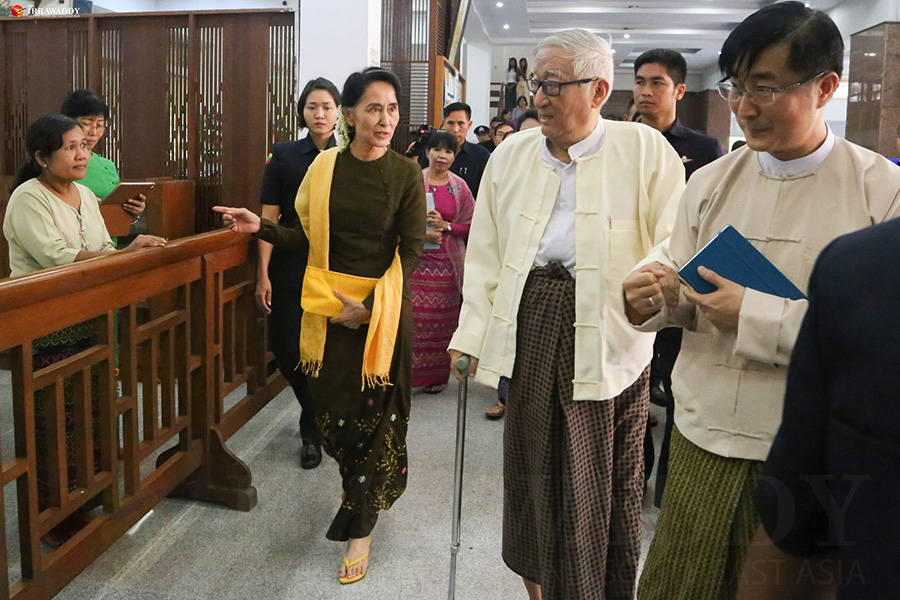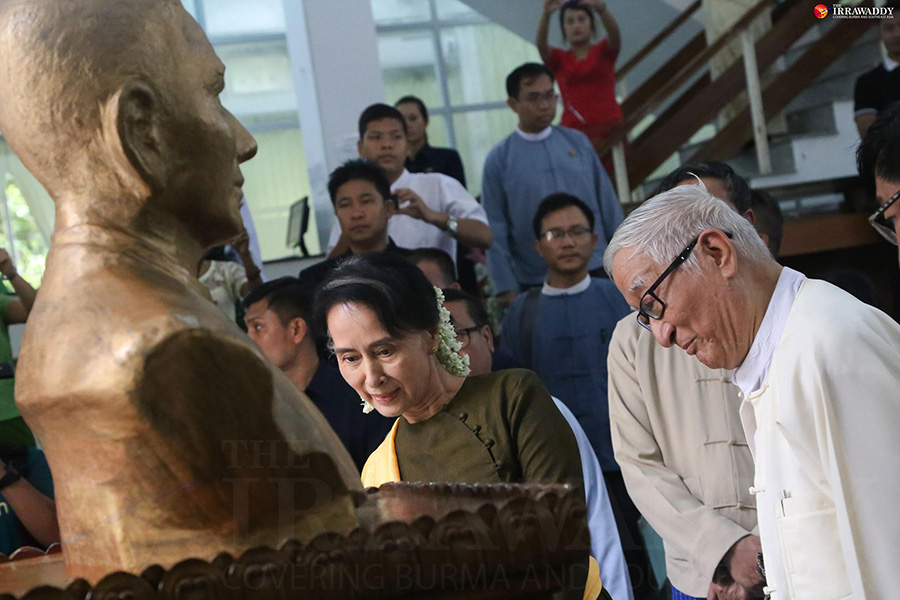YANGON — Sitting in an easy chair in his living room, U Thaw Kaung is thinking about his students and his book-strewn office at the Universities Central Library (UCL) on the campus of Yangon University.
Since suffering a head injury last year, the 81-year-old retired chief librarian and former head of the university’s Department of Library and Information Studies has been advised to stay indoors in case he falls. As a result, his Tuesday ritual—a weekly visit to the library—has been put on hold.
“I miss the visits,” he said, insisting they would resume once he has fully recovered. His doctors have told him he can go out in a wheelchair, but he is reluctant to do so.
“I feel uneasy using the chair, as I need someone to assist me. I used to drive there,” he said with a laugh.
Thanks to his promotion of library studies at the university level, his efforts to preserve traditional manuscripts, and his establishment of the Myanmar Library Association, U Thaw Kaung is Myanmar’s most internationally renowned scholar-librarian. And while he may be confined to his home, he has not been idle. Since his retirement in 1997, he has embarked on more research on the country’s history, literature and culture and published his findings in English in order to deepen international understanding of the topics. Currently, he is editing a book that will reproduce a palm-leaf manuscript chronicling a 1749 Myanmar diplomatic mission to China.
“It describes the mission in detail, right down to the presents given to China,” he said, adding that the work will be “an addition to the historical record of Myanmar-Sino relations.”
‘The One Less Traveled By’
A career librarian, U Thaw Kaung started out as a senior clerk at the library at the Rangoon Institute of Economics. At the time he was 20, having just finished his final year of English studies at Rangoon University. In 1959, he joined the University of Rangoon Library as a deputy to then librarian U Thein Han (one of Myanmar’s national poets, who published under the pseudonym Zaw Gyi) and studied librarianship at University College, University of London.
“At that time, library-related work was not a popular profession,” he said.
Born into a bibliophile family, and frequently sick with rheumatoid arthritis as a child, U Thaw Kaung grew up surrounded by books. Wanting his ill son to be comfortable, U Thaw Kaung’s father, U Kaung, who served as the Director of Education, encouraged his son to become a librarian and asked his friend Zaw Gyi to take care of him. When U Thaw Kaung joined the University of Rangoon Library, the poet-cum-librarian took him under his wing.
Recalling the reasons for his decision to pursue librarianship, he said, “Apart from my health, I myself have always been an avid reader. I saw how peaceful Saya Zaw Gyi was [as a librarian]. I wanted to follow in his footsteps, though I was not on the same level as him. Plus, you can study whatever you want [as a librarian].”
Looking back after nearly six decades, he has no regrets.
“Instead of sorrow, I have gained the success I deserve because I took the one less traveled by,” he said, quoting a line from Robert Frost’s poem “The Road Not Taken”.
The American poet would doubtless agree that having chosen a less popular line of work “has made all the difference” for U Thaw Kaung.

He eventually became chief librarian of UCL, where he served until his retirement in 1997. During his tenure, he set up the Faculty of Library Studies at Rangoon University and taught for almost three decades, with a vision of producing a new generation of librarians. Now the course is available at universities in Yangon and Mandalay.
During less busy periods at the library, and when he wasn’t teaching, he traveled around the country with his students in search of rare books—especially palm-leaf and folded paper manuscripts (known as “Parabike”)—completing the mission his mentor Saya Zaw Gyi initiated.
They hit old monasteries or private libraries across the country, raiding their dusty collections of manuscripts, many of which had been virtually devoured by insects or destroyed by the elements. When owners declined to donate the manuscripts, U Thaw Kaung bought or copied them.
“Sometimes, it took years to convince owners to sell, as they were attached to what they had collected,” he recalled.
U Thaw Kaung was able to establish a special section at the central library to preserve palm-leaf and paper manuscripts. By the time he retired in 1997, the section was a trove of more than 16,000 manuscripts available to researchers on ancient Myanmar literature or history, and many other subjects related to the nation’s culture. The effort won him the Fukuoka Asian Culture Prize in the Academic category in 2005.
In their summary, the awarders of the prize described U Thaw Kaung as “a leading authority in the field of library studies in Asia, with a focus on Myanmar….he has made many contributions to the preservation and utilization of valuable palm-leaf and paper manuscripts.” (Other Fukuoka Prize winners from Myanmar include historians Dr. Than Tun and Dr. Thant Myint-U.) Among his other international honors, U Thaw Kaung was the first Southeast Asian librarian to be elected an Honorary Fellow of the Library Association U.K., and was named an Honorary Doctor of Letters by the University of Western Sydney.
“I don’t think I won those awards because I’m smart; I’m just lucky,” he said modestly.
He also feels fortunate to have had the encouragement of his parents and mentor Zaw Gyi, and to have been born in Myanmar, enabling him to collect old manuscripts and set up the Department of Library and Information Studies. He thanked his like-minded students and staff for making it possible to promote library studies and establish the Myanmar Library Association, which he founded in 1992 with the goal of upgrading the country’s libraries so that they could establish international connections. Before retiring, he also oversaw the introduction of IT literacy programs at UCL for use in future e-library systems.
Today, the library has developed a database with a wide range of scholarly e-journal and e-book collections accessible from nine universities in Yangon and Mandalay, while offering access to catalogs from 23 university libraries across the country, according to current UCL librarian Daw Ni Ni Naing, one of U Thaw Kaung’s former students.
“He has always encouraged and directed the development of libraries. He even made international training possible for us,” she said.
‘Helping Those Who Seek Knowledge’
Apart from collecting manuscripts and promoting library studies in Myanmar, U Thaw Kaung is famous among local and international scholars for assisting their work with “his vast knowledge of the library’s holdings,” as leading Southeast Asia and Myanmar scholar Robert Taylor puts it.

In the 1980s, U Thaw Kaung learned that Daw Aung San Suu Kyi, who at that time would make occasional visits to the country to conduct research about the role of writers in Myanmar’s independence struggle, was not welcomed by some libraries. So he opened the UCL’s doors to her, saying: “Come here. We are more resourceful.” (She last visited the library in July last year, to promote a culture of library use in government schools.)
The late Dr. Than Tun, a renowned historian of Myanmar and a fellow Fukuoka recipient, wrote the following accolade for U Thaw Kaung when he received the prize: “He is always kind and helpful to all people (foreign or indigenous) to access (even) rare documents in their research…. May he remain helpful to us forever.”
Taylor, who has known U Thaw Kaung since 1978, described his long-time friend to The Irrawaddy as “a very good scholar, a fantastic librarian, and a warm and sincere human being.” In particular, he recalled a six-month research stint at UCL in 1982 for which, he said, he owed much to the librarian’s inspiration and hard work. In his article for a felicitation volume to mark U Thaw Kaung’s 75th birthday in 2012, Taylor suggested the librarian played a role in making possible his 1987 book “The State in Myanmar” and other of his publications on the country over the years.
“U Thaw Kaung found materials for me that I would not have found on my own and introduced me to a number of important figures in Myanmar’s political and cultural life,” Taylor told The Irrawaddy.
But U Thaw Kaung insists he simply did what any librarian should do while upholding the library’s motto: “Helping Those Who Seek Knowledge”.
“If they tell me what they want to know, I explain to them and guide them to what they should read. It’s my job,” he said.
Despite his life of achievements, the 81-year-old still feels the development of libraries in Myanmar lags far behind even that of neighboring or regional countries, suggesting the government should be more supportive, as college libraries still lack resources.
“Librarians’ capacities need to be upgraded as well,” he said, pointing out that a librarian’s range of tasks has become more sophisticated than ever in the age of information technology. He explained that, at a minimum, today’s librarians require the know-how to use electronic databases and find information online.
“Basically, they are still an interface between users and information,” he said.
So, how to be a good librarian?
“You have to read and want to help others. What you read should not just be for you, but for others [to be able to help them with what they need],” he explained.
Anyone who has interacted with U Thaw Kaung in the academic arena will understand exactly what he means.













